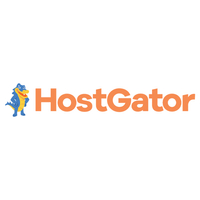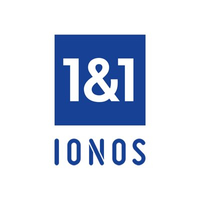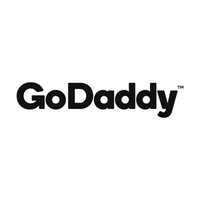HostGator vs IONOS vs GoDaddy
Which of the three website builders is best?
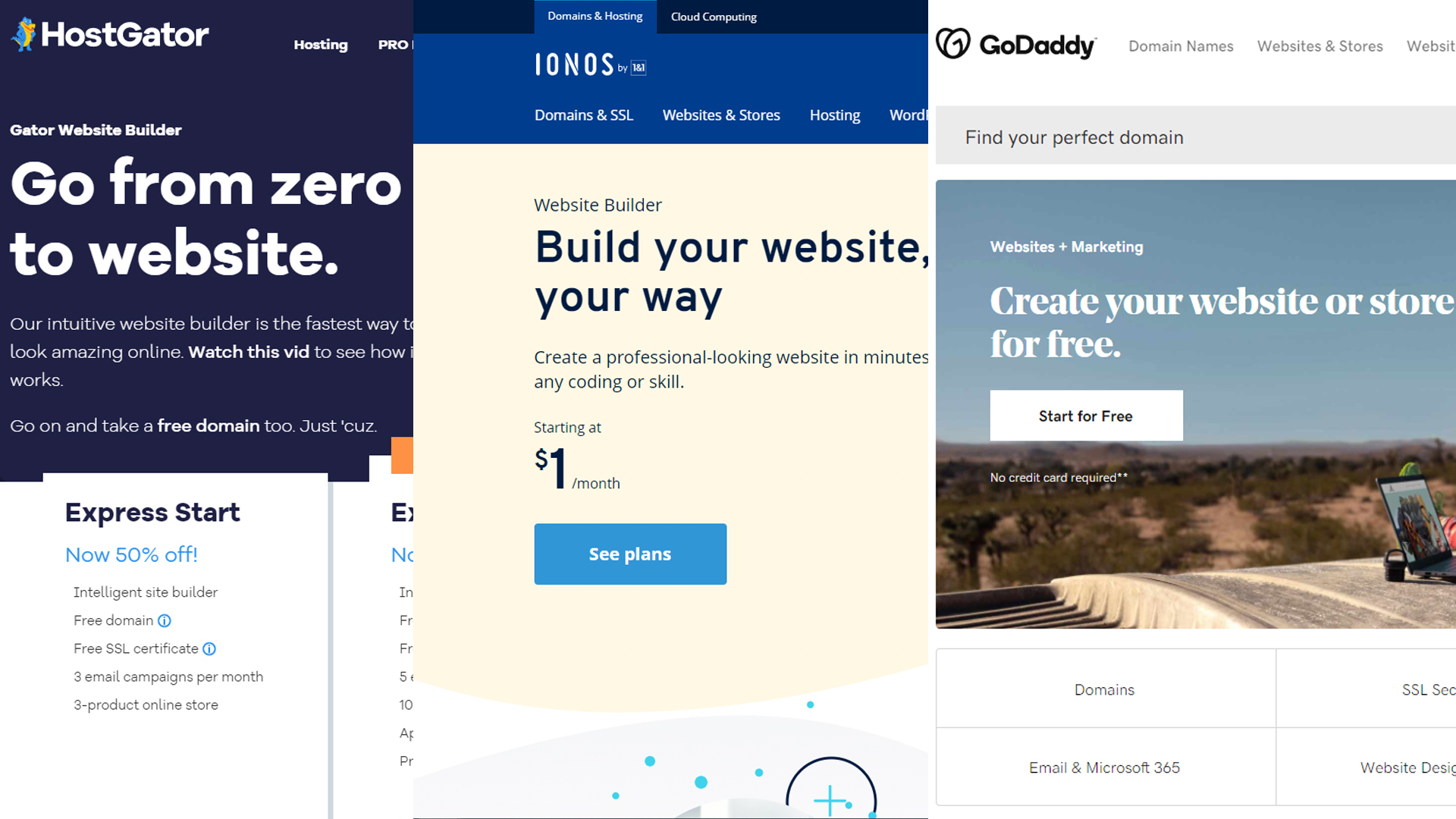
When you're looking to build a website, the best website builders offer beginners and experienced users alike a great starting point. They make building a website easy, and allow you to create a fully functional, responsive site, even if you've got no prior experience.
Most builders also offer hosting and domain name plans, for a one-stop shop for all your website needs. Additionally, some of the best web hosting services offer some of the top website builders with their hosting packages, including HostGator, 1&1 IONOS, and GoDaddy.
While not all website builders offer the same features, and their plans can differ significantly, here we pit HostGator vs IONOS vs GoDaddy against one another in terms of their website builders. We compare their plans, features, performance, and more, in order to help you choose the best builder for your needs.
HostGator: top templates and excellent customer support
HostGator's Gator Website Builder utilizes a drag-and-drop interface to generate simple, mobile-friendly websites. With over 200 completely customizable templates, there's scope for endless personalization, while a generous support package and free analytics offer further functionality.
1&1 IONOS: easy-to-use builders over competitive plans
1&1 IONOS' website creator is available via the MyWebsite Now or MyWebsite Creator builders, over a series of competitively-priced plans. The builders come with a wide array of templates and great functionality for all sizes of business, with their drag-and-drop editors featuring a built-in targeted content system.
GoDaddy: a simple builder with powerful analytics
GoDaddy's built-in website creator is simple, easy-to-use, and offers in-house integrations for complete compatibility and security. Again using a drag-and-drop editor, GoDaddy's excellent support and powerful analytics allow beginners to focus on important elements, and customize their sites.
HostGator vs IONOS vs GoDaddy: Features
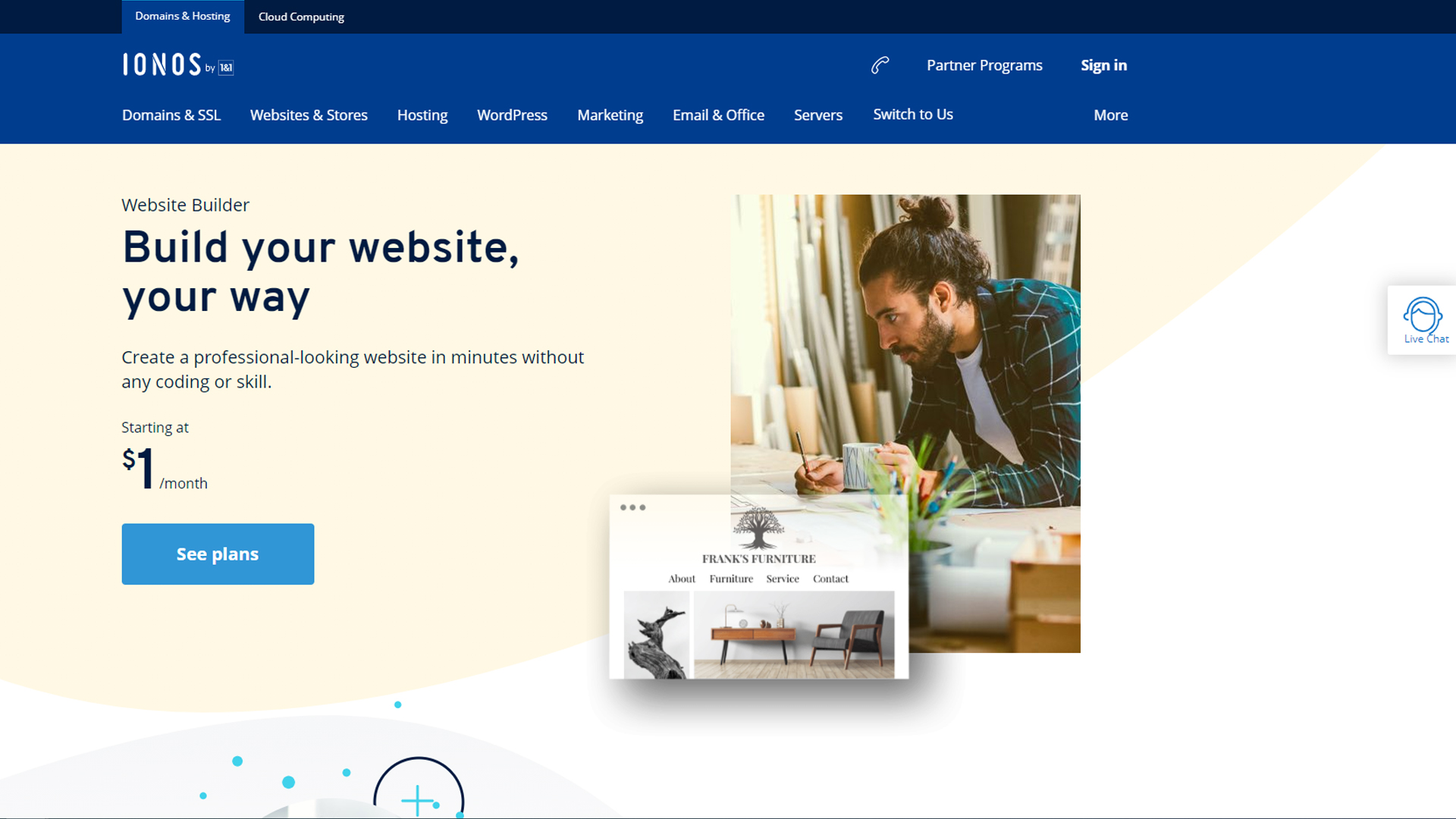
We looked at some of the most important features needed to quickly and easily build a functional, professional-looking website. Each builder has its own strengths and weaknesses, so be sure to check which offers the features you need the most.
For many professionals, the ability to sell their products or services online is an essential feature—the whole reason they’re building a website in the first place. Of the three, HostGator has perhaps the most limited ecommerce features: you can choose a template and set up a simple online store, manage products, accept payments and integrate with Shippo shipping, but that’s all.
GoDaddy and IONOS offer more features and finder control. Both have a selection of templates to get you started and make it easy to sell products, services, and digital goods. Each syncs with your Facebook, Instagram, Amazon, Etsy, and other online marketplace profiles, which is a very convenient feature and will help those with little social media experience.
Both enable you to set up newsletters to increase engagement, although IONOS comes with built-in discount and coupon functions, which paired with newsletters makes for a simple but powerful marketing tool. IONOS also has a great mobile app, so you can add and modify products from a smartphone or tablet, as well as track your sales.
Sign up to get the BEST of Tom's Guide direct to your inbox.
Get instant access to breaking news, the hottest reviews, great deals and helpful tips.
On the flip-side, GoDaddy offers online appointments, which will appeal to a wide range of service-based professionals. It’s also quite a bit cheaper than IONOS. Its $24.99 a month plan includes all features, whereas IONOS charges $45 a month for Amazon and eBay integration.
In our opinion, GoDaddy offers the best ecommerce experience at a fair price that includes all its features—although if solid mobile access and discount and coupon features are important for you, IONOS' $25 a month plan will serve you well.
HostGator vs IONOS vs GoDaddy: SEO and templates
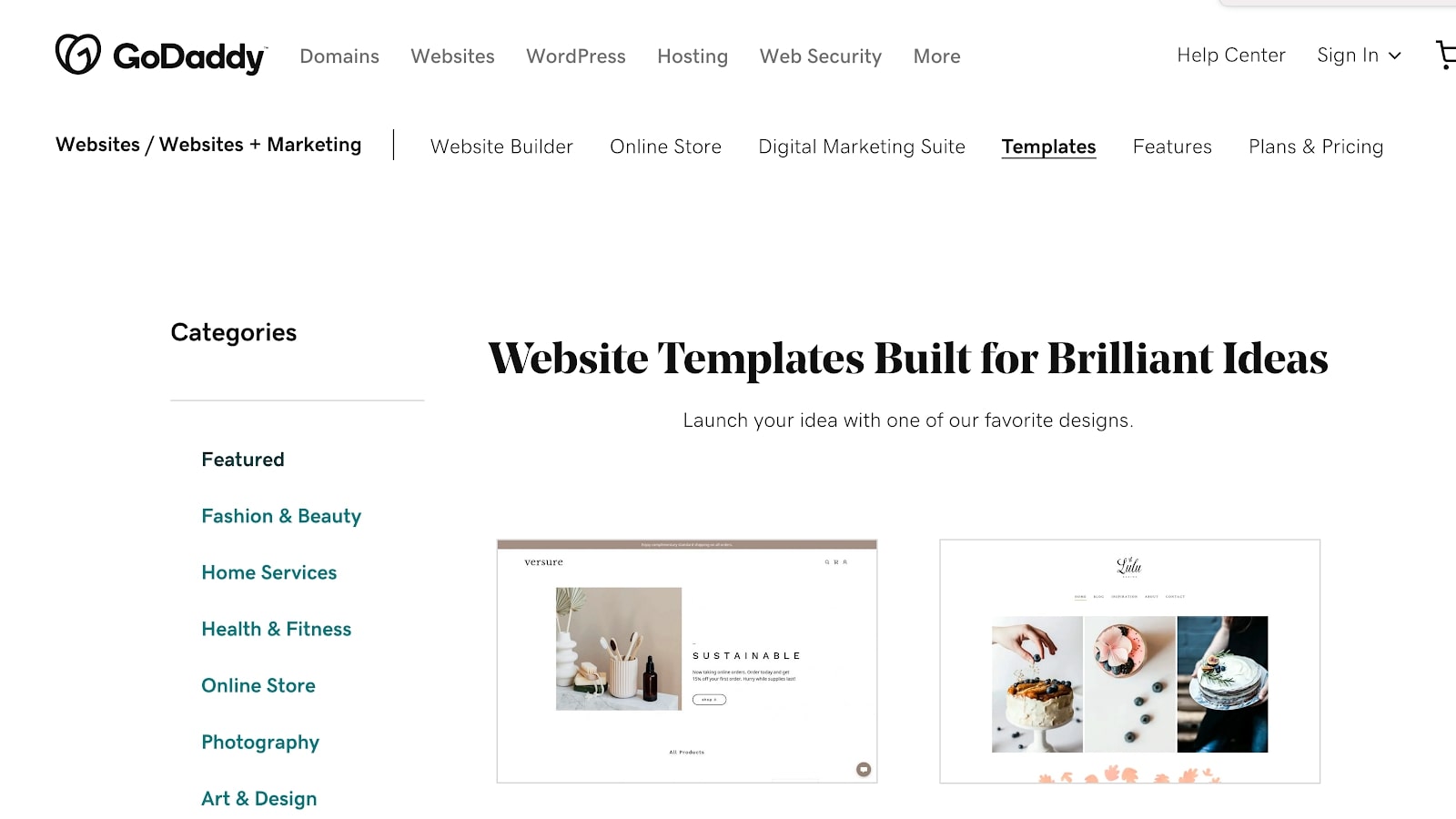
Website SEO (search engine optimization) is important for making sure people can find your site easily, by ranking you higher on search engine result pages.
All three companies offer paid SEO help, and if you’re completely unfamiliar with SEO or why it’s important, this may be a worthwhile investment for you. The cheapest by far comes with HostGator, as SEO tools are part of its Business Plan. With introductory offers and a 36-month plan, offers go as low as $5.95 a month.
Otherwise, GoDaddy offers SEO tools at $6.99 a month, although they’re more of a self-service deal. Same with IONOS' rankingCoach, which at $10 a month is the most expensive. All three offer you the ability to do your own SEO work though, such as editing meta descriptions and title tags, so if you have a decent knowledge of SEO (or plan on teaching yourself), you can forego these add-ons.
That said, since they come free with HostGator’s Business Plan, you might swing this way if you’d like the helping hand.
Most individuals creating their first site with a website builder will not want to start entirely from scratch. A wide array of customizable templates is thus a big help for beginners. Simply choose a template that fits your style and sector, and edit it as needed. IONOS offers over 400 templates, which is a good start, although they aren’t categorized, which makes it a bit difficult to find the right style.
GoDaddy also has hundreds of templates, this time organized into categories like fashion and beauty, home services, and professional services. The designs are elegant and tend to be simplistic (read: manageable).
HostGator beats both, with over 4,000 templates grouped into more than 50 categories. That said, we found the templates to be of generally lesser quality, busy, and dated. GoDaddy comes out on top for its wide array of truly stunning templates.
HostGator vs IONOS vs GoDaddy: Interface
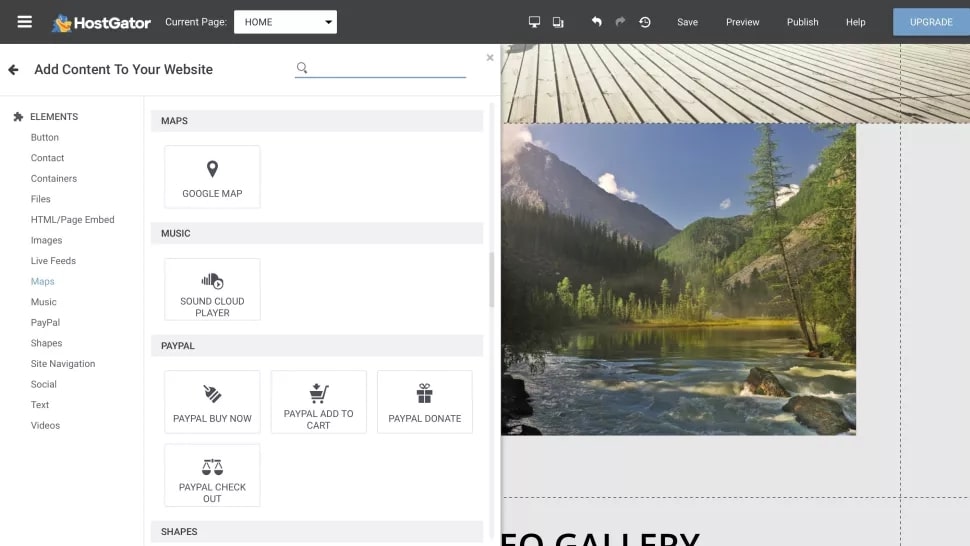
An intuitive, responsive, powerful interface is what we’re looking for in a website builder. GoDaddy is the most basic of the three, although beginners may find this a boon. You can choose a template, rearrange your elements, and customize your content. You can also change colors globally or for each element, but ultimately, it’s a fairly limited tool.
IONOS provided for somewhat greater control. It’s still a classic drag-and-drop interface, which we prefer for ease of use, but the end results are still heavily influenced by the original template.
HostGator’s Gator Builder is the most powerful of the three, enabling you to personalize almost every aspect of your website. You can add and remove a wide array of elements, and modify them at a very fine level.
That said, some users may find the experience less user friendly, and the fact that the templates aren’t all that snazzy to begin with means you need a far stronger sense of design (and more time on your hands) to make it all work.
HostGator vs IONOS vs GoDaddy: Support

For beginners and pros alike, it’s not uncommon to need to contact customer support. When that happens, you want support you can count on.
IONOS offers live, 24/7 phone and email support, although it has no live chat, which is a feature we’d love to see added. Its knowledge base and IONOS guides are quite comprehensive, and well organized into sections, sub-sections, and articles. Some of the articles are a bit short, but overall, it’s a quite good resource, as is the user forum.
GoDaddy offers 24/7 live chat and phone support. It has no email support or email follow-up, which can make it difficult to get help on the same issue at different times (by referring to a ticket number or past conversation, for example). It has a wide range of tutorials and good documentation, plus an active community forum.
Finally, HostGator, like GoDaddy, has live chat and phone support, but no email ticketing options. It does have a very impressive knowledge base though, and we found its support staff to be friendly and knowledgeable.
HostGator vs IONOS vs GoDaddy: Pricing and plans
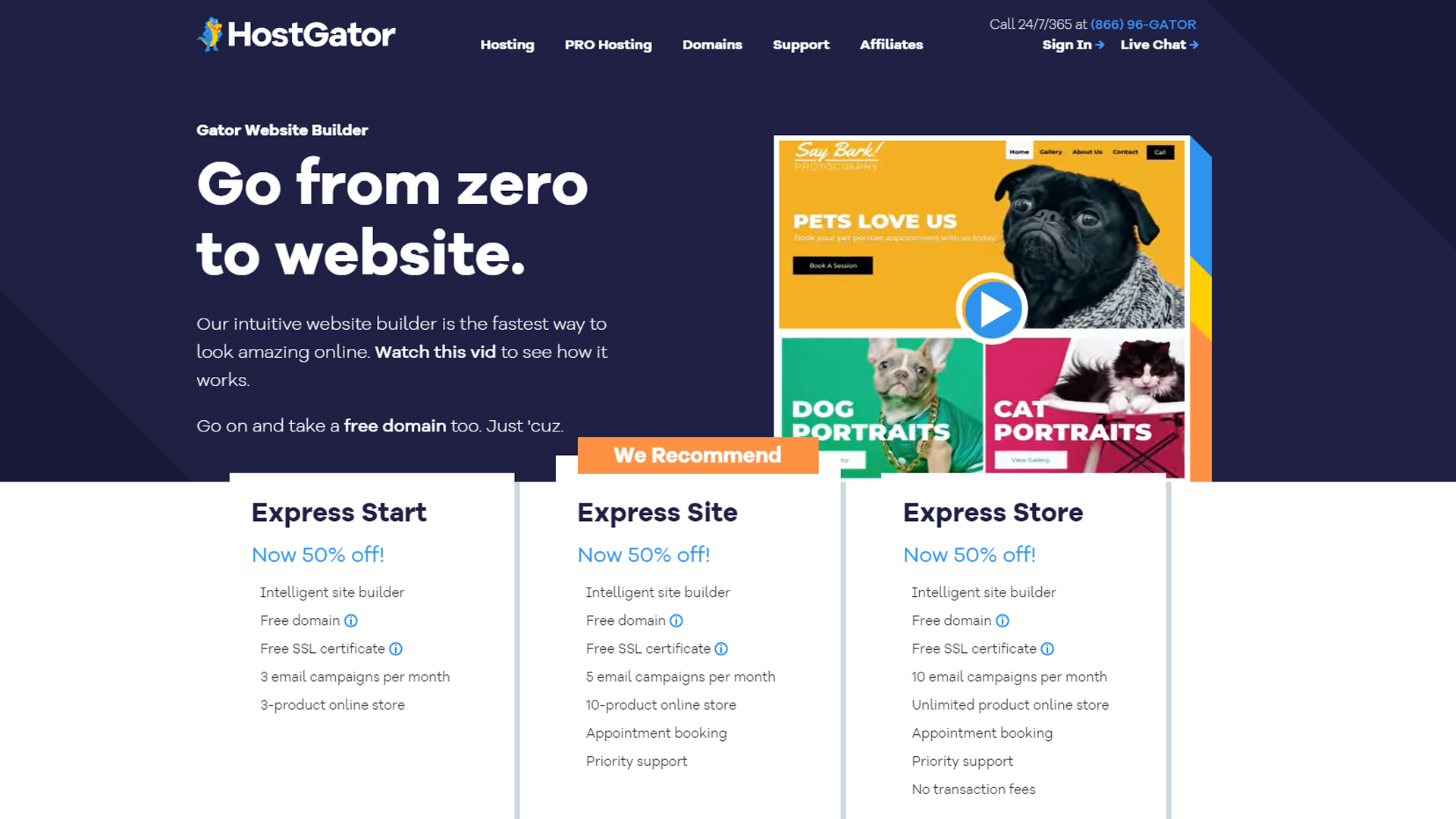
HostGator has some enticingly cheap plans, starting at just $3.84 a month with hosting, domain name, drag-and-drop builder, templates, analytics, SSL certificate, and classic support. For $5.99 a month, you get priority support, and for $9.22 a month, ecommerce functionality. Even at the most expensive plan with website builder access, then, it’s among the cheapest.
IONOS’ website builder plansare separated into different areas based on the type of site and support you want. The Starter plan is $5 a month for basic sites or $12 a month for ecommerce sites, and allows you to customize text and images, but not much else. The Plus plan at $10 a month has no online store, but adds one for $20 a month with up to 5,000 products.
The Pro plan costs $15 a month for a basic website or $35 a month for an online store with up to 10,000 products, but doesn’t add much beyond the Plus plan.
GoDaddy offers the greatest range, with four plans starting at $6.99. Its Ecommerce plan, at $17.49 a month, is the most expensive option from all three companies. Business email addresses are also only free for one year, although SEO, guidance, and analytics are also included at this rate.
If you don’t need an online store, the Premium plan at $13.99 a month offers plenty of features, including appointments, email marketing, and unlimited social posts.
HostGator vs IONOS vs GoDaddy: Verdict
You’ve probably understood by now that your choice will depend a lot on what you’re looking for. If you just want the cheapest possible solution and are comfortable with a powerful but somewhat less user-friendly website builder, go with HostGator.
The price can’t be beaten and, while the templates aren’t quite as chic, there are a huge number of them. You can also tweak to your heart’s content.
IONOS offers a fantastic ecommerce experience, and its online store plans are just a bit cheaper than GoDaddy’s equivalent. The simplistic bsite builder is well-suited to beginners, and while it has the fewest templates on offer, we found them to be quite attractive.
Finally, GoDaddy comes with excellent ecommerce functionality, gorgeous templates, and great user support. While its Ecommerce plan is the most expensive, it includes a lot of attractive features. If you don’t need an online store, the intuitive website builder and beautiful templates make it very easy to set up a simple website, and you won’t need much more than the standard plan.
Further reading on website builders
If you're looking to find a particular kind of website builder for a certain type of site, make sure to read our guides to the best small business website builders and the best ecommerce website builders. Also take a look at how much it costs to build a website, and our guide to the best cheap website builders on the market.
Christian is a freelance writer and content project manager with over six years' experience writing and leading teams in finance and technology for some of the world's largest online publishers, including TechRadar and Tom's Guide.
